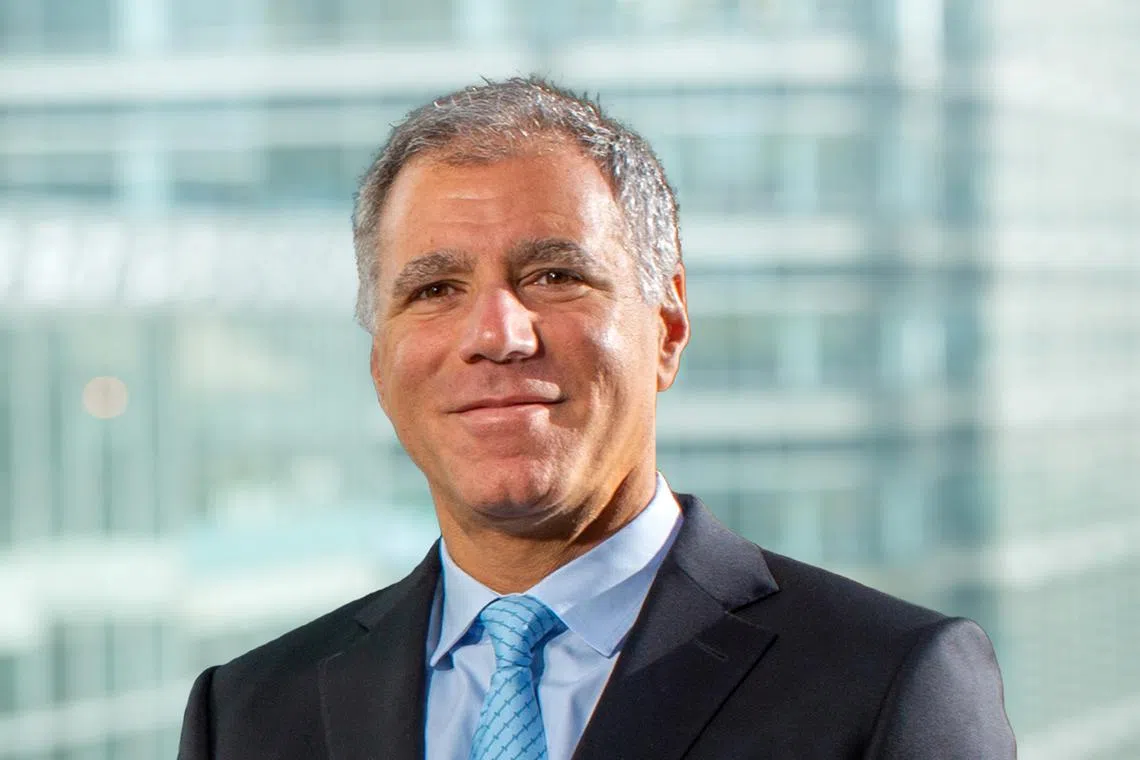HSBC’s new CEO looking to shake up lender; possible cost cuts, say analysts
Sign up now: Get ST's newsletters delivered to your inbox

Since he took over, HSBC CEO Georges Elhedery has weighed kicking off what could amount to its most significant restructuring in more than a decade.
PHOTO: HSBC
London – With just two weeks under his belt as the new chief executive officer of HSBC Holdings, Mr Georges Elhedery has made it clear he is looking to make his mark on the bank.
Since he took over, Mr Elhedery has weighed kicking off what could amount to HSBC’s most significant restructuring in more than a decade. He has also considered disposing of a couple of non-core businesses and he has been pleading with staffers to keep costs in check.
It is no wonder the former chief financial officer is looking to move swiftly. As central banks around the world cut interest rates – moves that will eat away at the revenue of big, global lenders like HSBC – Mr Elhedery will have to find a way to shave off US$2 billion (S$2.6 billion) in costs in order to sustain a key measure of the bank’s profits, according to Bloomberg Intelligence.
Investors are now hoping Mr Elhedery will either offer new targets for expenses or detail his plans for keeping a lid on the company’s efficiency ratio – a metric that shows how much it costs to produce a dollar of revenue – by the end of the year. The Lebanese-born executive will get his first chance to update the market when HSBC reports its third-quarter earnings in October.
“Job cuts, further disposals and organisation streamlining are all potential options on the table,” said Mr Tomasz Noetzel, an analyst at Bloomberg Intelligence. “The new CEO may need to dial up focus on cost cuts as there is little or no room to bolster revenue in a declining rates environment.”
In his first week as CEO of Europe’s largest bank, Mr Elhedery was not getting comfortable at HSBC’s headquarters in London’s Canary Wharf. Instead, he was on a whirlwind tour around Hong Kong.
He made a pit stop at an HSBC branch and wealth centre. Alongside Mr David Liao, the co-head of the lender’s Asia-Pacific business, Mr Elhedery spent time with the firm’s commercial banking staff. He also met with government officials and regulators.
Starting his tenure in the business hub was meant to be a clear signal that while Mr Elhedery had largely made his career outside of Asia, he recognised the importance of the region to the bank.
While making his rounds, Mr Elhedery, who has spent the past couple of years learning Mandarin, told staffers in a town hall there would be a continued spotlight on costs across the banking behemoth, according to people who attended the event. Still, he told employees his bigger focus would be ensuring the company is spending wisely rather than spending less, the people said.
“Responding to a slowing Asian economy and lower interest rate environment, HSBC’s new CEO is using this opportunity to make many strategic cuts and structural changes,” said Mr Mark Williams, a master lecturer in the finance department at Boston University’s Questrom School of Business.
Investors are still digesting some of Mr Elhedery’s early moves. HSBC’s stock has barely budged since the start of 2024, rising just 3 per cent until the close of trading on Sept 13. That compares with the 15 per cent advance of the FTSE All-Share Bank Index, a basket of its closest rivals.
Latest restructuring
HSBC is no stranger to restructuring. Under previous CEOs, the bank sold some of its largest operations and pivoted toward core markets in Asia. Those moves have helped the company trim more than 50,000 jobs in the last decade.
Still, previous reorganisations left HSBC with 214,000 employees – about 7 per cent above target, according to Bloomberg Intelligence.
That is, in part, what led Mr Elhedery to begin weighing combining HSBC’s commercial and investment bank divisions in recent weeks. The effort would bring together HSBC’s global banking and markets business, its least profitable unit, with its most efficient one: the commercial banking arm.
The combined division would generate about US$40 billion of revenue a year and bring together a more than 90,000-person strong workforce to go out and win business with companies of all sizes.
“He’s not hanging around,” said Mr John Cronin, founder of the consultancy Seapoint Insights. “The pros are that it leads to greater unity across the bank in the longer-term; albeit I suspect it would be quite disruptive in the short-term, with much internal resistance.”
Staff at the bank are already gearing up for the change, which will likely coincide with a new drive to strip out layers of middle management. As part of the recent deliberations, the company has weighed cutting country managers, who are increasingly seen as a layer of bureaucracy the lender can ill afford as interest rates begin to fall.
“Overall, it’s good news for HSBC investors,” said London School of Economics Centre for Economic Performance professor Tom Kirchmaier. “He’s an insider, so he can make the changes quickly.”
Further asset sales also look likely. The bank said this week it had begun a strategic review of its business on the small Mediterranean island of Malta. HSBC is also looking to offload its operations across South Africa and is in talks to sell its corporate banking unit in the country to FirstRand’s Rand Merchant Bank.
Having developed a reputation as a consensus-building and collegiate executive, Mr Elhedery is now showing a different side as he takes quick action to rightsize the lender.
He’s “keeping people who he feels are very instrumental at developing business and also reducing overheads”, said Mr Allan Zeman, a Hong Kong business tycoon and a long-time client of the bank. “He’s just making the moves.” BLOOMBERG


